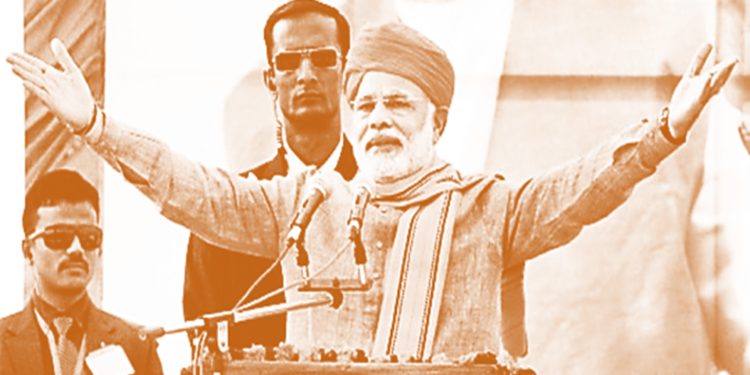Although widely discredited by the Communists and perhaps precisely because of that reason, Bonapartism, as a socio-political ideology holds great promise for India. An 18th century construct, Bonapartism, at that time, essentially implied a Dictator cum strongman in charge of a centralized state, who used personal charisma to drive a message of anti-elitism and social conservatism with support of the military and the masses. Communists used Bonapartism as an epithet, describing it as a subversion of the revolutionary masses by elites who falsely professed revolutionary ideals to beguile the masses. It was in line with this description that Stalin, Mao and even Trotsky are described as Bonapartists pejoratively. However, much has changed since the 18th century, when Bonapartism first came to the fore under Napoleon’s leadership. The modern world is essentially democratic and in line with democratic ideals,
Bonapartism is widely believed to manifest in a leader who is popularly elected, rises above party politics, believes in the nation and has unshakeable faith in national unity.
Additionally, such a leader is believed to be socially conservative, has faith in equality, progress and social change. In the form of Prime Minister, Narendra Modi, it seems India finally has a Bonapartist leader at its helm.
Even before he was appointed as the Prime Minister, Narendra Modi burnished his anti-elitist credentials by putting himself as the humble outsider challenging the elitist Lutyens-Gandhi dynasty alliance. Bestowed with a strong charisma, aided with excellent oratorical skills, Narendra Modi was able to capture the attention of the masses who longed for change. He was able to don the avatar of a Change Agent who wanted to demolish everything that the Congress, the Gandhis and their Lutyens lap dogs stood for. When Modi spoke of India and restoring it to its glory, the masses were able to relate to a leader, who finally seemed to genuinely want to bring positive change to their lives. Once he became the Prime Minister, Narendra Modi ensured that he retained his direct connect with the masses. His rallies continued to be attended by thousands. By calling himself the Pradhan Sevak, instead of Pradhan Mantri, Modi ensured that he maintained his anti-elitist credentials. Additionally, he began putting some of his electoral promises into words, thereby assuring the masses, that here was a leader, willing to walk the talk. His foreign policy initiatives, with Pakistan, China, US and Russia, while not necessarily party-approved, helped catapult him into an international statesman. The Bonapartization of Narendra Modi was now in full swing. Narendra Modi was able to secure the support of the masses, draw grudging praise from his opponents and ensure that the world heard him when he spoke.
However, the true proof of Modi’s phenomenal transformation has been the Demonetization initiative. In one go, Narendra Modi was able to prove that he was willing to sacrifice the narrow interests of vote banks for the greater good of the country. It surely could not have been an easy decision to take, given that BJP essentially continues to be the party of middle class businessmen, petty traders and realtors. By one decision, Narendra Modi has rendered his vote bank destitute. Within days of his decision, queues of hundreds formed outside ATMs and banks. It seemed that a brave political decision would be undone by shoddy execution and yet, people by and large stood by Modi. From distant villages to metropolises, the masses stood in queues patiently, tolerated the cold and the rain and still credited Modi for walking the talk. Repeated attempts by the opposition to incite the masses have fallen flat and surveys indicated more than 4 in 5 Indians were solidly behind Modi in this initiative. Like Lee Kuan Yew of Singapore and other East Asian leaders who executed an Economic Miracle in their countries, Modi has been able to rise from petty sectional interests and command the nation’s confidence to push the right policies, even if they cause trouble in the short term.
At the same time, Narendra Modi’s eyes are firmly set on the modernization of the Indian armed forces. Ever since Modi government took power, armed forces have become increasingly aggressive against provocations by Pakistan and China. Unlike days of yore, when India seemed to be struggling to keep J&K under control, Modi government has been vocal about issues in PoK and Baluchistan. With stalwarts such as Ajit Doval in the team, Modi government has come down heavily against terrorists and militants. India of today seems to be a far cry from the ‘Soft State’, it was widely touted to be in the early 2000s.
In a way, it seems that the Bonapartization of Narendra Modi is now complete. Demonetization initiative has transformed Narendra Modi into a Robin Hood who robs the rich to help the poor.
For those who have long claimed that Modi is in cahoots with the Capitalists and Big businesses, there is nothing more Anti-Elitist than being a Robin Hood. No wonder the opposition, in spite of its cacophony is in a complete disarray. Modi the Bonapartist is here to stay!
Reference:



























